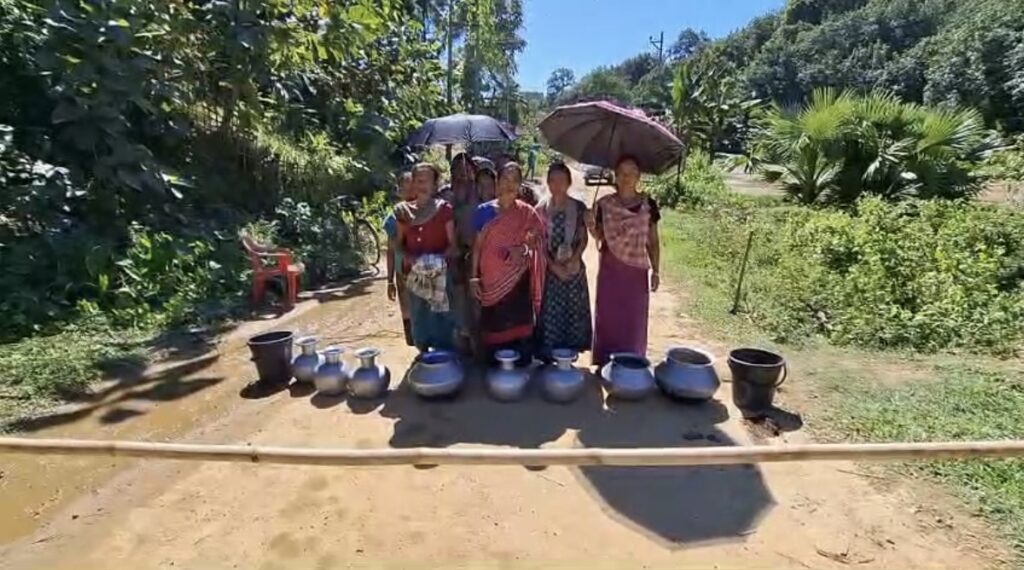Residents of Kanalbari, a locality in Tripura, have been enduring a harrowing ordeal for over two weeks as they have been left without access to basic amenities such as clean drinking water and electricity. The situation has reached a boiling point, prompting the frustrated residents to stage a protest, demanding immediate action from the authorities to restore these essential services. The ongoing crisis has not only disrupted the daily lives of Kanalbari’s residents but also raised serious concerns about the state’s preparedness to handle such critical infrastructure issues.
The Crisis in Kanalbari
For 13 consecutive days, the residents of Kanalbari have faced an acute shortage of potable water and power, making their lives unbearable. The locality, which is situated on the outskirts of Agartala, the capital city of Tripura, is home to hundreds of families who rely on the local water supply and electricity grid for their day-to-day needs. However, due to recent technical failures, a combination of electrical faults and a malfunctioning water supply system, both services have been cut off.
According to local sources, the power outage began when a major transformer in the area malfunctioned, affecting the entire locality. At the same time, the water supply system in Kanalbari, which draws from a nearby reservoir, also broke down due to lack of maintenance and technical failures, leaving residents without access to clean drinking water. The residents have since been forced to rely on makeshift methods to fetch water from distant sources, which are not only inadequate but often unsafe for consumption.
As the days passed with no response from local authorities or any relief in sight, residents began to voice their concerns. Their patience reached its limit, and a peaceful protest was organized, demanding that the state government take immediate steps to restore their access to water and power.
A Growing Public Outcry
The protest in Kanalbari has drawn the attention of both local media and political leaders, with many questioning the state government’s inability to resolve such a basic yet crucial issue. The protestors gathered in large numbers, holding placards and chanting slogans, demanding swift action from the Tripura State Electricity Corporation (TSECL) and the Public Health Engineering (PHE) Department to restore services.
“We are fed up with the government’s indifference. For the past 13 days, we’ve been living like animals. We don’t have clean water to drink, and we are left in the dark with no electricity. Our children are suffering, and we can’t even prepare food properly. The authorities have ignored us, and this protest is our only option,” said one of the local residents, visibly frustrated with the ongoing crisis.
Political parties, including the opposition, have expressed solidarity with the protestors, accusing the ruling government of negligence in handling basic infrastructure issues. They have also pointed out that similar issues have plagued other areas of the state in the past, and there has been no substantial effort to improve the reliability of water and power supplies across Tripura.
“We have been demanding proper infrastructure and timely maintenance for years. The situation in Kanalbari is just a glimpse of the larger problems that Tripura faces in terms of basic civic amenities. It is high time that the state government focuses on these issues instead of making promises that never materialize,” said an opposition party leader, who visited the site of the protest to express solidarity.
Government Response and Challenges
In response to the mounting public pressure, the state government has promised that the necessary repairs will be carried out promptly. Officials from the Tripura State Electricity Corporation and the Public Health Engineering Department have assured that they are working to resolve the issues. However, this response has done little to placate the residents, many of whom feel that the authorities have been too slow in addressing their grievances.
The state government has also claimed that the region’s infrastructure has been under strain due to recent heavy rainfall, which has caused damage to various electrical and water supply lines. This has been a point of contention for many protestors, who argue that these issues are not new and should have been anticipated and addressed long ago. The residents are demanding that the government take a more proactive approach to infrastructure maintenance and ensure that such disruptions do not recur in the future.
Impact on Daily Life
The lack of water and power has had a severe impact on the daily lives of Kanalbari’s residents. Without electricity, many families are unable to cook food, while the absence of clean drinking water has led to concerns about waterborne diseases. Children and the elderly, in particular, are at risk, as they are more vulnerable to the lack of basic sanitation and nutrition.
The ongoing crisis has also affected the local economy, with small businesses and shops being unable to operate properly due to the power outage. The situation has created a sense of frustration and helplessness among the residents, who are demanding that the authorities act swiftly to restore normalcy.
Looking Forward
The Kanalbari protest is a stark reminder of the challenges faced by many communities in Tripura when it comes to basic infrastructure and civic amenities. The state government’s response to the crisis will be critical in determining the extent to which residents can rely on the government for their everyday needs.
For now, the residents of Kanalbari have made their message clear: they will not tolerate further neglect of their basic rights to water and electricity. As the protest continues, the hope is that the government will respond with urgency and resolve the ongoing crisis before it escalates further. The people of Kanalbari deserve nothing less than access to clean water and reliable power, and they are determined to continue their fight until their demands are met.

